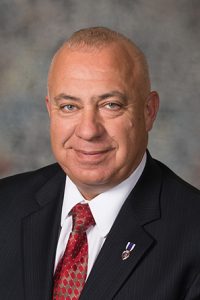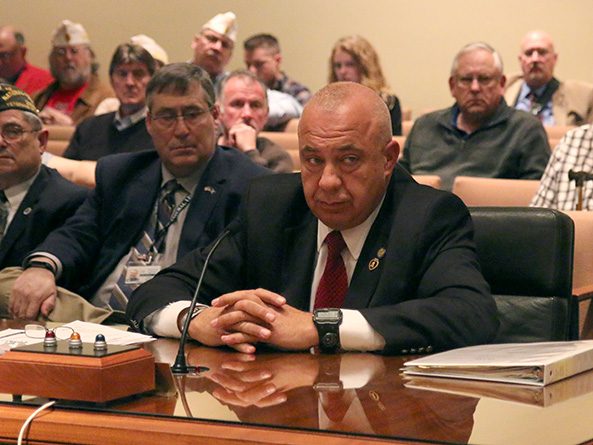Tax exemption for military retirement pay requested
Members of the Revenue Committee heard testimony Feb. 10 on a bill that would exclude a portion of military retirement pay from Nebraska state income tax.
LB121, sponsored by Sen. Tom Brewer of Gordon, would exempt benefit income in increasing increments of $10,000 per year over a period of five years, beginning in 2018. For 2022 and after, up to $50,000 could be excluded.
Brewer said retired veterans are well-educated and highly trained, and often start second careers in the private sector or as government contractors. But many military retirees leave Nebraska for other states, including Iowa and Kansas, that do not tax military retirement benefits, he said.
“Letting our veterans keep more of their military pensions will cause a modest reduction in income tax revenue,” Brewer said, “but I think the economic benefits of attracting highly skilled, trained veterans with strong leadership qualities outweigh whatever tax dollar loss there is.”
The state Department of Revenue estimates that LB121 would reduce state income tax revenue by approximately $4.2 million in fiscal year 2017-18 and approximately $27 million in FY2021-22, when the bill is fully implemented.
Current law allows those receiving military retirement pay to exclude 40 percent of their benefit pay from income tax for seven years or 15 percent a year for life beginning when they turn 67. LB121 would allow taxpayers to choose that exclusion before Dec. 31, 2017, or within two years of their retirement, whichever comes first. It also would allow taxpayers to revoke that election so that they can take the bill’s proposed exemption.
Larry Gerlt, senior vice commander of the VFW Department of Nebraska, testified in support of the bill. He said it would help Nebraska retain a high-quality workforce and improve quality of life for military retirees, most of whom receive only about $20,000 a year in retirement pay.
“If I lose 5 percent of that to Nebraska [income tax], it may not sound like much to you, but that may be the crucial difference between seeing my daughter and three grandchildren in Phoenix each year for Christmas,” he said.
Also speaking in support of the bill was Pat Jones, a military retiree from Bellevue. He and his wife enjoy living in Nebraska, he said, but now that his wife also is close to retirement, they are planning to move to Texas to avoid paying income taxes on his military retirement benefits. Jones said the state would forego not only the income tax he would have paid on benefits, but taxes on the rest of their spendable income.
“Yes, [the bill] helps the military retiree, but in the long run it’s really helping Nebraska,” he said.
Paul Cohen, speaking on behalf of the Military Officers Association of America, also testified in support of the bill. Nebraska has seen no increase in the number of military retirees as a result of a more limited military retirement pay exclusion that began in 2014, he said, compared to a 1 to 2 percent gain in neighboring states that have more attractive incentives.
Last summer, Cohen said, he met a newly retired U.S. Air Force senior master sergeant who had received nearly identical job offers at insurance companies in Omaha and Des Moines.
“He chose Des Moines,” Cohen said. “It saved him nearly $6,000 in taxation on his military retirement pay.”
No one spoke in opposition to the bill and the committee took no immediate action on it.


